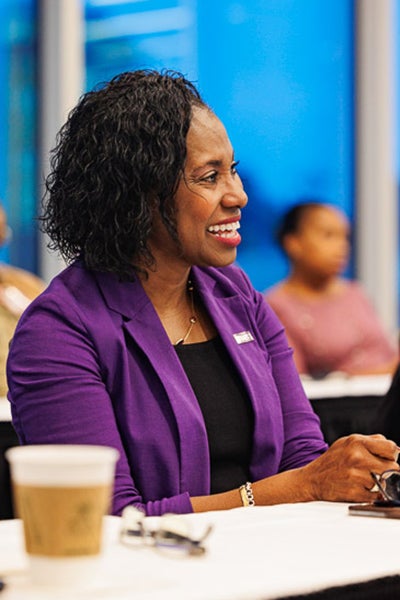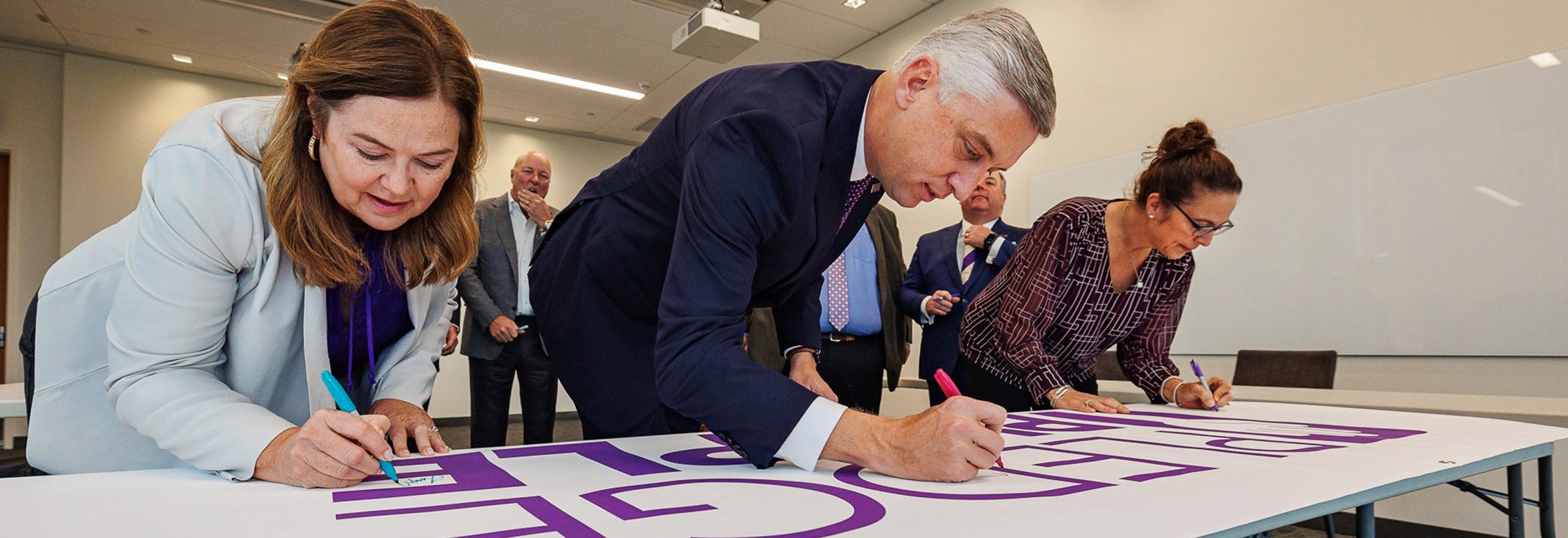INVESTING IN STUDENTS
Trustees approve site for medical education building
East Carolina University’s Board of Trustees on Friday approved the site of a new medical education building on the health sciences campus. Trustees also approved an increase in tuition for several graduate-level health sciences programs and for select student fees for the 2023-24 academic year.
The board recommended increases in tuition for medicine, dental medicine, graduate nursing and physician assistant studies programs, and for student fees for campus recreation and wellness and dental materials. Those recommendations must be approved by the UNC Board of Governors (BOG).
ECU trustees also approved increases to dining plans and transit fees, which don’t require BOG approval and will take effect in fall 2023.
The increases are needed to maintain services for students and to help offset rising costs of food and gas, programming, maintenance and repairs, as well as employee wages and benefits, according to board materials. Even with the proposed increases, ECU’s tuition remains one of the lowest in the state. ECU’s Student Government Association approved a resolution in support of the increases.
Chancellor Philip Rogers said he is mindful of the importance of providing a world-class education and services for students while maintaining a commitment to affordability.
“Earning a degree or a credential is an investment — a personal investment, a family investment, a lifelong investment that pays significant dividends when you attend our institution,” Rogers said.
“We also have a responsibility to be thoughtful about the financial burdens that are realities for many of our students, which is why we have been quite intentional and deliberate in our approach to bringing fee and program specific tuition differential proposals forward in a way that accounts for those goals.”
The BOG is expected to consider tuition and fee adjustments early next year.
If approved, tuition for the Brody School of Medicine will increase from $20,252 to $22,252 per year. Brody’s tuition is ranked fifth lowest in the United States. Tuition for dental students would increase from $29,944 to $31,444 per year.
Tuition differential increases are proposed in the following programs: master’s in nursing; post master’s in nursing; doctor of nursing practice (DNP); Ph.D. in nursing; and physician assistant studies. Differential tuition is charged on top of ECU’s base tuition and fees for graduate students, which is $7,622 for in-state students and $20,771 for out-of-state students.
ECU’s physician assistant (PA) studies program has the lowest tuition of any program in North Carolina. The tuition differential would increase from $3,937 to $7,222 if approved. The increase is for clinical placement sites, a student support position and operating costs.
In fees, students would see a $20 increase per year for transit and campus recreation and wellness. Transit fees would rise from $158 to $178 per year, although the net increase to students would be $16 due to a realignment of off-campus services. Several on- and off-campus routes and services have already been reduced or cut. The last fee increase for transit was in 2016-17.
Campus recreation and wellness (CRW) fees would go from $271 to $291 per year. CRW has already made adjustments to operating hours and reduced staff to offset increased costs. Dining costs will increase up to 4.2% depending on the meal plan.
Facilities and committee updates
In facilities, construction on a new medical education building, 500-space parking deck and utility plant is expected to begin in 2025 with an anticipated completion in mid to late 2027. The planned multi-story, approximately 220,000-square-foot medical education building will be adjacent to the current Brody Medical Sciences Building at Moye Boulevard and North Campus Loop. It is intended to support enrollment growth from 86 to more than 120 medical students per year.
Trustees approved TA Loving/Barnhill/Metcon as the construction managers at risk for the new medical education building. In addition, construction managers at risk were approved for renovations on the Howell Science Building (Muter) and Mendenhall Student Center (Bordeaux).

ECU’s chancellor and trustees recognized Dr. Virginia Hardy, vice chancellor for students affairs, who is retiring.
Also Friday, Rogers recognized Dr. Virginia Hardy, who is retiring as vice chancellor of student affairs at the end of the year after almost 30 years of service. The board passed a resolution honoring Hardy’s leadership, support and commitment to ECU and its students.
During committee meetings Thursday, trustees made recommendations and heard presentations focused on student success and engagement.
University Affairs Committee members approved the conferral of degrees for 2,003 students who have applied to graduate during commencement on Dec. 16. The full board also approved the measure.
Dr. Robin Coger, provost at ECU, pointed to many things ECU is doing to overcome challenges to student success, such as providing experiential learning, project and team experiences, engagement with discipline experts and leadership training.
Students joined faculty and staff in a panel discussion about three specific programs — the RISE 29 student entrepreneurship program, Course-Based Undergraduate Research Experiences (CUREs) and the State Employees’ Credit Union Public Fellows Internship Program that provides undergraduate students opportunities to work in communities to address a specific need or project.
“These CUREs opportunities gave me a really good chance to get this research aspect and gave me a lot of good relationships not only with the faculty but people in the field,” said Ben Brisard, an interdisciplinary biomedicine, biology and chemistry doctoral student. “With that, it really helped me land my first job in industry and further led me to the Ph.D. program here.”
Dr. Jeremy Tuchmayer, senior associate director of assessment, research and planning in ECU’s Division of Student Affairs, presented a program outlining nonacademic issues such as stress and mental health that affect freshmen and prevent them from succeeding. Based on first year assessment surveys, 1,059 students had multiple stressors, and were offered support through special programs and available resources.
The BOT Committee on Strategy and Innovation met over lunch Thursday and hosted a student panel discussion on civil discourse. Current students Kamari Purvis and Montgomery Coudriet, along with recent alumni Mariama Ibrahim and Giovanni Triana, discussed their experience with controversial topics both inside and outside the classroom, as well as on social media. The students agreed that ECU does a good job overall with allowing and encouraging free speech, but that the issue won’t get any easier in the coming years.
Purvis said the university should explore additional ways to encourage and engage students to continue their conversations beyond class.
Before the panel discussion, Dr. Timothy Ryan, associate professor of political science at UNC-Chapel Hill, provided an overview of the results of a survey of students at eight UNC System institutions about free expression and constructive dialogue on campus. He said the report found little evidence to support the common narrative of political indoctrination by college professors.
He also identified some of the challenges in ensuring free speech on campus, including the tendency for the conversation to be dominated by the loudest, most passionate voices, which tend to be those with the most extreme positions and not representative of the community as a whole.
Dr. Michael Waldrum, dean of the Brody School of Medicine and chief executive officer of ECU Health, provided the committee an update on the health system integration. Signage continues to be updated throughout the region, he said, and employees are undergoing brand training to ensure that they understand and are comfortable with representing the new, integrated organization.
In other business:
- In the Audit, Risk Management, Compliance and Ethics Committee, trustees approved minor changes to the annual audit plan and heard an update on name, image and likeness compliance from the athletics department. They also heard an update from Dr. Lynn Roeder, dean of students, about student crisis management and the increase in referrals to the CARES and University Behavioral Concerns Team following the pandemic as students readjusted to living on campus and being together after more than a year apart — 1,152 CARES Teams referrals in 2021-2022 compared to 521 in 2020-2021 and 805 in 2019-2020. “We knew it was coming,” Roeder said. “What was surprising was the severity of it.”
- The Athletics and Advancement Committee learned the Pursue Gold Campaign has raised $421 million to date. The committee recommended, which was approved by the full board, naming the chair’s suite in family medicine in honor of Dr. James Jones, and Gate 8 at Dowdy-Ficklen Stadium for the Greene family.
